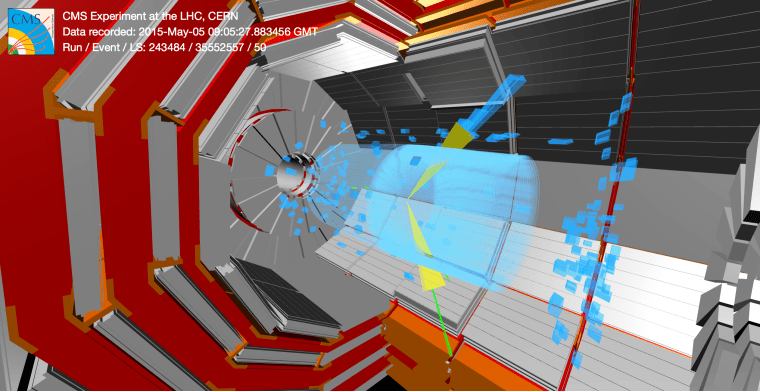Beams of protons were colliding with each other inside the Large Hadron Collider on Tuesday, for the first time since the world's most powerful particle accelerator was shut down for repairs and upgrades two years ago.
Europe's CERN particle physics center said the collisions resumed at a relatively low level — 450 billion electron volts per beam, or 450 GeV, for a total energy of 900 GeV. At the end of its previous run, the LHC was smashing protons at energies of 8 trillion electron volts, or 8 TeV, and CERN plans to have it hit 13 TeV by the end of the year.
Data from the LHC confirmed the existence of the Higgs boson in 2012, providing the last puzzle piece for the Standard Model, a theory that describes how fundamental subatomic particles should work together. It's one of the most successful theories in physics, but thousands of researchers are hoping that the LHC's next run will taken them into new territory beyond the Standard Model.

Flash Interactive: Inside the Big Bang Machine
To get the $10 billion LHC ready for its ramp-up, the 17-mile-round (27-kilometer-round) underground superconducting ring was closed down in early 2013. Engineers replaced the interconnections between the LHC's powerful magnets to make sure they could stand up to the higher power levels. A month ago, CERN resumed circulating proton beams around the magnet ring, but the team held off on having the beams collide until Tuesday.
Proton-on-proton collisions were delivered to all four of the LHC's detectors — ALICE, ATLAS, CMS and LHCb. CERN said the shots will be used to fine-tune the detectors.
"Each low-energy collision sends showers of particles flying through an experiment's many layers," CERN explained in Tuesday's statement. "The experimental teams can use this data to check their subdetectors and ensure they fire in the correct place at the precise instant that a particle passes."
CERN said the LHC's operations team was about halfway through an eight-week schedule to prepare the beams for the full-scale scientific run. The collision energy will be raised to 13 TeV over the next month or so, and scientific data will be taken starting in early June.
Gallery: Biggest Particle Smasher Gets an Overhaul
One of the objectives will be to follow up on the Higgs boson's detection with more detailed measurements of its characteristics. But the research teams will also look for evidence of exotic phenomena ranging from dark matter particles to microscopic black holes and extra dimensions.
Back in February, ATLAS physicist Beate Heinemann told reporters that the evidence could emerge as soon as August or September. But Matt Strassler, a theoretical physicist who's a visiting professor at Harvard University, says it could take much longer to nail down a definitive discovery of dark matter particles.
"It requires several fortunate things to happen in a row," Strassler wrote in a preview of the LHC's upcoming scientific campaign, "so while it's not impossible, don't hold your breath. More likely, if it happens, it will take quite a while, perhaps decades."
Theoretical physicist Matt Strassler will discuss the prospects for discoveries at the LHC with NBC News' Alan Boyle on Wednesday's installment of "Virtually Speaking Science," an hourlong talk show airing at 8 p.m. ET via BlogTalkRadio. You can also watch the show as part of a live virtual audience in the Exploratorium's Second Life auditorium. If you miss the live show, never fear: You can always catch up with the podcast in BlogTalkRadio's archive or on iTunes. April's show featured a discussion about private-sector spaceflight with Virgin Galactic's Will Pomerantz.
